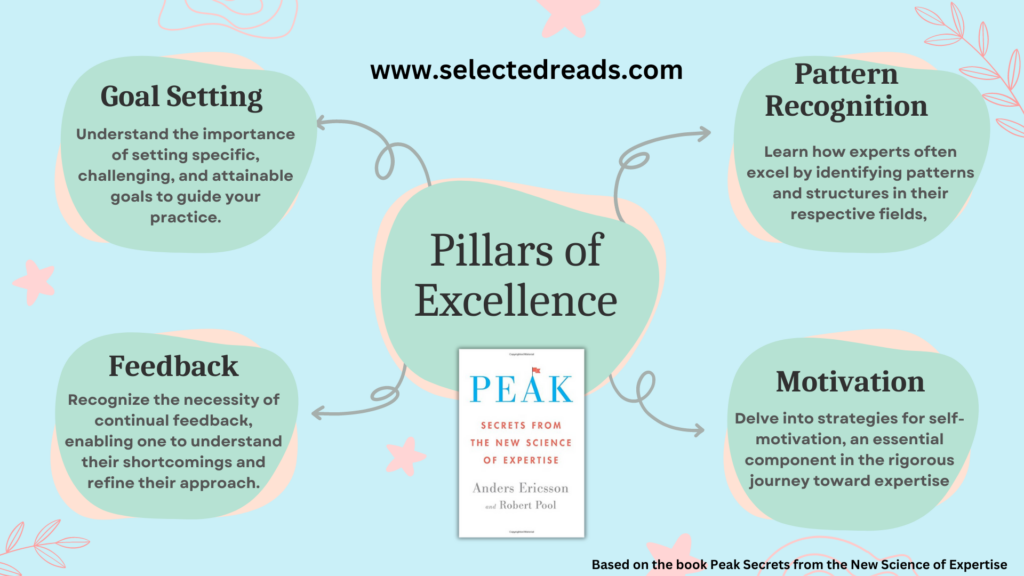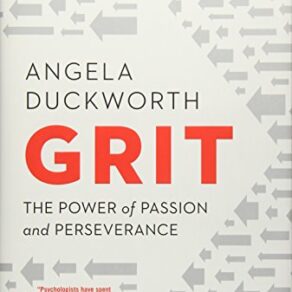There’s a prevailing notion in society that mastery in any domain is reserved for the gifted few. Those prodigies born with a special talent that the rest of us can only envy. But what if this wasn’t the case? What if expertise was more about dedicated training than innate genius?
In my recent reading adventure, I delved deep into “Peak: Secrets from the New Science of Expertise” by Anders Ericsson and Robert Pool, a transformative exploration of the true nature of expertise. And let me tell you, it was an eye-opening experience I thoroughly enjoyed!
In this post, I’ll share my takeaways and insights from the book, breaking down its central message and the implications it holds for how we view skill acquisition and mastery. I’ll present a concise summary of “Peak” and the groundbreaking idea it introduces. We’ll also dive into its main lesson, a collection of thought-provoking discussion questions, and some memorable quotes that have left an indelible mark on me.

What is the main lesson in Peak: Secrets from the New Science of Expertise?
The main lesson from “Peak: Secrets from the New Science of Expertise” by Anders Ericsson and Robert Pool is that true expertise and mastery in any field are achieved not primarily through innate talent, but through dedicated, focused, and deliberate practice.
The book posits that almost anyone can attain high levels of proficiency or even become an expert in their chosen domain with the right approach to training and practice. This entails setting clear goals, seeking constant feedback, and consistently pushing oneself out of one’s comfort zone.
The concept of “deliberate practice” introduced in the book emphasizes that not all forms of practice are equally effective; what truly matters is how one practices. The transformative power of purposeful training underscores the idea that potential is expandable and that with the right mindset and approach, one can continuously grow and improve in their chosen endeavor.
Peak: Secrets from the New Science of Expertise Summary
The concept of mastering a skill often seems insurmountable to many. The realm of experts, with their seemingly innate prowess in various fields, feels distant. However, in “Peak: Secrets from the New Science of Expertise,” Anders Ericsson and Robert Pool demystify the journey to expertise, bringing it within reach of the average individual.
Drawing on three decades of rigorous research, Ericsson, a pioneer in studying the anatomy of expertise, delves deep into the lives and practices of experts. From chess maestros and celebrated athletes to virtuoso musicians and memory experts, Ericsson unpacks what truly lies behind their exceptional abilities.
Central to the book’s theme is the dispelling of common misconceptions. Contrary to popular belief, innate talent isn’t the sole determinant of expertise. In fact, Ericsson’s studies reveal that the traditional perception of skill acquisition is flawed. Instead, excellence is more about deliberate and focused practice than any inherent genius, an idea also echoed in Duckworth’s book Grit: The Power of Passion and Perseverance.
The essence of “Peak” revolves around breaking down expertise into a series of specific, attainable practices. Ericsson introduces the concept of “deliberate practice,” a method that emphasizes purposeful and systematic training. It’s not just about practicing more, but practicing right.
Valuable Insights:
The book goes beyond just the theory, offering a plethora of actionable insights:
- Goal Setting: Understand the importance of setting specific, challenging, and attainable goals to guide your practice.
- Feedback: Recognize the necessity of continual feedback, enabling one to understand their shortcomings and refine their approach.
- Pattern Recognition: Learn how experts often excel by identifying patterns and structures in their respective fields, allowing for more efficient problem-solving.
- Motivation: Delve into strategies for self-motivation, an essential component in the rigorous journey toward expertise.
Peak: Secrets from the New Science of Expertise Discussion Questions
Here are some discussion questions for “Peak: Secrets from the New Science of Expertise” by Anders Ericsson and Robert Pool:
- Deliberate Practice: How does “deliberate practice” differ from the typical ways we practice skills or hobbies? Can you think of any personal experiences where deliberate practice might have changed the outcome?
- Innate Talent vs. Practice: Do you believe that some people are just born with certain talents, or do you think that with enough deliberate practice, anyone can become an expert in anything?
- Feedback: The book stresses the importance of feedback. How does our society typically view feedback, and how can we shift our mindset to see it as a crucial part of growth?
- 10,000 Hour Rule: The idea that 10,000 hours of practice can lead to expertise in a field has been popularized in recent years. How does “Peak” expand, clarify, or challenge this concept?
- Education Implications: How can the principles from “Peak” be applied in educational settings to improve learning outcomes and cultivate expertise in students?
- Motivation: Deliberate practice is hard and often not inherently enjoyable. How can individuals maintain motivation over long periods to engage in such practice?
- Societal Implications: If everyone believes and acts on the principles presented in “Peak”, how might our society change? Would there be ramifications in the workplace, in education, or in personal endeavors?
- Limitations: Are there any limitations or dangers in applying the deliberate practice model too rigorously in one’s life?
- Memory Training: One of the examples in the book pertains to memory training. Do you think the techniques used for memory athletes could be beneficial in everyday life? Why or why not?
- Personal Goals: After reading “Peak”, have you identified any personal goals or skills that you would like to develop using deliberate practice? What’s your plan of action?
Peak: Secrets from the New Science of Expertise Quotes
Here are some standou:t quotes from the book Peak: Secrets from the New Science of Expertise:
1. “Learning isn’t a way of reaching one’s potential but rather a way of developing it.”
2. “This is a fundamental truth about any sort of practice: If you never push yourself beyond your comfort zone, you will never improve.”
3. “The reason that most people don’t possess these extraordinary physical capabilities isn’t because they don’t have the capacity for them, but rather because they’re satisfied to live in the comfortable rut of homeostasis and never do the work that is required to get out of it. They live in the world of “good enough.”
4. “you have to keep upping the ante: run farther, run faster, run uphill. If you don’t keep pushing and pushing and pushing some more, the body will settle into homeostasis, albeit at a different level than before, and you will stop improving.”
5. “If we can show students that they have the power to develop a skill of their choice and that, while it is not easy, it has many rewards that will make it worthwhile, we make it much more likely that they will use deliberate practice to develop various skills over their lifetimes.”
6. “So here we have purposeful practice in a nutshell: Get outside your comfort zone but do it in a focused way, with clear goals, a plan for reaching those goals, and a way to monitor your progress. Oh, and figure out a way to maintain your motivation.”
7. “Regular training leads to changes in the parts of the brain that are challenged by the training. The brain adapts to these challenges by rewiring itself in ways that increase its ability to carry out the functions required by the challenges.”
8. “A world in which deliberate practice is a normal part of life would be one in which people had more volition and satisfaction.”
9. “Deliberate practice involves well-defined, specific goals and often involves improving some aspect of the target performance; it is not aimed at some vague overall improvement.”
10. “The key thing is to take that general goal—get better—and turn it into something specific that you can work on with a realistic expectation of improvement.”
Final thoughts
“Peak” is more than just a study of expertise; it’s a guidebook. It challenges the intimidation surrounding mastery, asserting that excellence lies within everyone’s grasp. By understanding and adopting the principles of deliberate practice, and with the right motivation, feedback, and goal-setting, any skill can be mastered. Whether you aspire to shine in your career, master a hobby, or support someone in their academic pursuits, “Peak” illuminates the path to achieving unparalleled expertise.
I hope you find Peak Secrets from The new Science of Expertise summary helpful!






